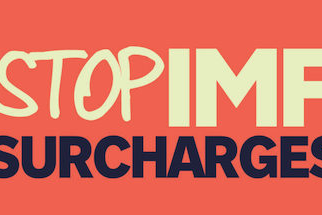Viewpoint: We still need a debt jubilee, 20 years on from the Birmingham human chain

Birmingham Human Chain 1998
Twenty years ago today, as a wide-eyed 16 year old, I went on my first ever protest. Travelling to Birmingham with a group from my church, we joined 70,000 others to surround the G8 summit, demanding debt cancellation for 52 impoverished countries by the year 2000.
Many countries had been trapped in debt for the previous two decades, with reckless lenders being bailed out by new loans from the IMF and World Bank, while economies stagnated and debt increased.
The 'Hands Around the G8' protest was a pivotal moment in the global 'Jubilee' campaign, the movement that came together to tackle the debt crisis, inspired by the Jewish scriptures' concept of 'jubilees', times when debts were cancelled and slaves freed. Eventually, after hard fought campaigning by people around the world, the G8 leaders returned to the UK in 2005 & committed to a significant amount of debt cancellation.
Thirty-six countries have now had $130 billion of debt cancelled through the initiatives created by the G8 in response to campaigning. However, there were three main failures of the campaign.
One was that in order to receive debt relief, countries had to bring in contentious free market economic policies, including water privatisation in Tanzania and selling off grain reserves in Malawi.
Secondly, many countries were excluded from the debt relief scheme because, despite facing big poverty challenges, they were considered to be too rich. Some of these, such as Jamaica and Pakistan, have continued to suffer an ongoing debt crisis for the last twenty years, with interest payments being extracted at a cost to poverty reduction and economic development.
Thirdly, the Jubilee campaign's proposals to prevent debt crises from occurring again were largely ignored.
Ten years after the 1998 protest, this failure was brought home with the financial crisis in North America and Europe, and subsequent Eurozone debt crisis which replicated many of the features of the 'Third World Debt Crisis' in the 1980s and 1990s. Ten more years on, we are now witnessing another debt crisis emerging across many impoverished countries. Average government external debt payments have increased 60% in the last three years, & are at the highest level since 2004
The IMF reports that of 67 impoverished countries it assesses, 6 are in debt distress, 24 at high risk, 27 at moderate and just ten at low risk of debt default.
Jubilee Debt Campaign has calculated that of the 52 countries we called for debt cancellation for in 1998, 20 have higher debt payments now, as a proportion of government revenue, than they did in 2000. This includes some who received debt relief, such as Ghana, Mozambique, Chad and Gambia.
Other countries now in debt crisis, such as Mongolia, Laos and Bhutan were not included in debt relief schemes, showing how vulnerable countries are to such crises. One key reason for this vulnerability is dependence on commodities - fossil fuels, metals and cash crops - for income earned from the rest of the world. Commodities vary wildly in price and often provide few jobs. When prices are high speculators are keen to give loans. But when they fall, economic collapse can be the result. The fall in commodity prices in 2014 is a central factor behind recent in- creases in impoverished country debt payments.
Jubilee Debt Campaign new research reveals that more countries have fallen into debt crisis. 31 countries are now in debt crisis across the world, up from 27 a year ago. There are a further 82 at risk of a crisis, as rising global interest rates threaten to make things worse.
Another factor behind rising debts has been the global interest rate environment. Since the 2008 financial crisis, interest rates have been kept low in order to try and stimulate growth in the US and Europe. This has led to lenders looking to increase lending to impoverished countries where they can get higher returns. In some of the most extreme cases, such as Mozambique and Republic of Congo, lenders and government officials have hidden loans from parliaments and the public, preventing the lenders from being held to account
Finally, governments are still failing to collect enough money in tax to fund basic needs and investments. There have been recent positive moves forward on tackling tax avoidance and evasion, but without adequate tax revenues, governments are left more dependent on debt to try to fund the sustainable development goals. Debt cancellation is a necessary response when debts are too high. But one-off debt cancellations will just lead to cycles of crisis being repeated unless the underlying causes of debt dependence are tackled. Governments and lenders need to be made more accountable, through regulations to strengthen transparency around lending.
And global action is needed to tackle tax avoidance and evasion, as well as renewed attention on policies which will enable countries to become less dependent on commodities.
The response to the new round of debt crises has been very similar to that in the 1980s and 1990s, and in the Eurozone in the 2010s. More loans are being given by the likes of the IMF and World Bank, enabling interest to be paid, while debts increase. This actively incentivises reckless lending, by ensuring lenders are paid off. Instead, lenders should be made to pay at least some of the price for reckless lending, with the costs of crises shared between borrower and lender.
This time we cannot wait another twenty years for a one-off sticking plaster solution - a debt relief scheme which provides limited breathing space but does nothing to address the underlying causes of the boom bust cycle of debt crisis. New rules for responsible lending alongside ending the system of bailouts for lenders will nip this crisis in the bud, and greatly reduce the chances of future global debt crises.
Read more on Tim Jones blog: https://jubileedebt.org.uk/blog/
Watch a video on the Birmingham Human Chain: www.youtube.com/watch?v=H0n-satXL7k





















